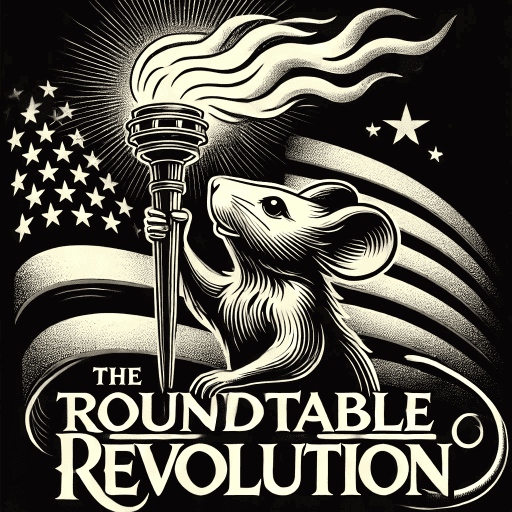
Guidelines for Framers of Integrity: Representing the Roundtable Revolution
As a Framer of Integrity in the Roundtable Revolution, you carry the responsibility of presenting the movement and its vision to others with professionalism, integrity, and clarity. Our mission is to offer solutions and provide a viable path forward for systemic reform—not to engage in partisan bickering or divisive debates. This document outlines the key principles and rules of engagement for all Framers of Integrity, ensuring we remain focused and effective.
The Roundtable Revolution is politics without the politics. By design, it’s meant to inform, inspire, and empower. This is a strategy of offense—not in hostility but in its creativity and innovation. We are approaching systemic reform from a direction that has never been attempted before—a plan designed to resonate with the American people’s true desire for clarity, unity, and meaningful change.
Unlike traditional politics, which often rely on eliciting emotional responses—usually anger or negative opinions about opponents—to connect, this movement cuts through that noise. Instead of playing on fear or division, we focus on logic, vision, and empowering the public with solutions.
Rules of Engagement
1. Avoid Personal or Partisan Politics
• Do not criticize or comment on individual politicians or parties.
• Refrain from discussing past or current political controversies unrelated to the mission.
• Focus conversations on the movement’s policies and their potential impact, not on assigning blame for current issues.
2. Stay Mission-Focused
• Every conversation should center around presenting the Roundtable Revolution as a viable solution for systemic reform.
• Highlight our key policies and how they interconnect to solve problems, rather than dwelling on what others are doing wrong.
• Remember, our goal is to inspire and inform—to show people they have a choice for something better.
3. Do Not Engage in Complaints or Negativity
• Avoid discussions rooted in frustration or outrage about political figures, events, or issues.
• Focus on the positive potential of the movement, not the failings of the current system.
• If someone brings up polarizing topics, gently steer the conversation back to the movement’s mission.
4. Frame the Conversation with Purpose
• Present the movement as an alternative that transcends partisanship, emphasizing unity, transparency, and fairness.
• Use “what if” questions to encourage curiosity and open dialogue (e.g., “What if we had a government that truly worked for everyone?”).
• While the ultimate goal is to win the public’s trust and support, avoid framing the conversation as a competition. Instead, focus on why these policies are worth supporting.
5. Acknowledge the Big Picture, Ignore the Noise
• Do not engage in discussions that distract from the mission, such as debates about cultural or social issues.
• The focus is on systemic reform, economic fairness, and government transparency—nothing more, nothing less.
• Keep in mind: Every distraction undermines the clarity of our message.
Talking Points
1. Lead with the Mission:
• “The Roundtable Revolution isn’t about left or right; it’s about solutions that work for everyone.”
• “We’re building a framework for fairness, accountability, and transparency in government.”
2. Highlight Key Policies:
• Discuss the interconnectedness of policies, like how the Equity Equation Project ties to campaign finance reform or how the Civic Knowledge Act empowers informed voting.
• Focus on the practical benefits of each policy, like improved wages, balanced energy solutions, or fairer representation.
3. Inspire with Vision:
• “What if we could rebuild trust in government by making it work for the people again?”
• “Imagine a system where every policy balances individual freedoms with shared responsibilities.”
4. Deflect with Positivity:
• If someone brings up a divisive topic, respond with, “That’s a great question, but our focus is on solutions that bring people together.”
• If pressed about specific political figures or events, say, “The Roundtable Revolution isn’t about individuals—it’s about fixing the system so it works for everyone.”
Critical “What If” Questions
Here’s a comprehensive list of “What if” questions to start the conversation:
1. On Governance and Accountability:
• What if we held our leaders to the same standards we expect of ourselves?
• What if transparency and accountability were the foundation of every political decision?
2. On the Economy and Equity:
• What if corporations reinvested in their workers and communities instead of just their executives?
• What if we could balance capitalism with fairness, creating opportunities for everyone?
3. On Campaign Finance Reform:
• What if elections weren’t decided by who raises the most money but by who has the best ideas?
• What if political candidates had to serve the people, not their donors?
4. On Education and Civics:
• What if every American understood how their government works and how to hold it accountable?
• What if civic education empowered voters to make informed choices based on facts, not fear?
5. On Energy and Sustainability:
• What if we brought traditional and renewable energy companies together to create a sustainable future?
• What if solar farms, wind turbines, and oil rigs worked in harmony to meet our energy needs?
6. On Representation:
• What if our elected officials truly reflected the diversity and values of the people they represent?
• What if we had term limits that ensured fresh ideas and reduced corruption?
7. On the Vision for Change:
• What if this movement could inspire the country to believe in itself again?
• What if we didn’t just talk about change but became the driving force behind it?
Closing Note
As a Framer of Integrity, your role is not to fight battles or win arguments—it’s to open doors and invite people to consider a better way forward. This movement is about having conversations that matter. It’s about lowering the tone of political discourse, staying focused on what truly impacts the lives of everyday Americans, and inspiring others to imagine what’s possible.
Our goal is to create opportunities for dialogue—whether it’s around the holiday table or in everyday conversations—where people with opposing political views can come together, set aside their differences, and share a vision for a better future. By framing these discussions with curiosity and respect, we turn “what if” into “why not,” sparking wonder and hope in a time when both feel in short supply.
While earning the public’s trust and votes is a critical part of our mission, the focus remains on presenting this movement as a practical, thoughtful, and fair alternative to the status quo. Stick to the mission, focus on the solutions, and let the policies speak for themselves. By staying aligned with these principles, we ensure that the Roundtable Revolution remains a source of unity, imagination, and meaningful change.
Share! Pass it along! That’s how this works! Let it begin!


